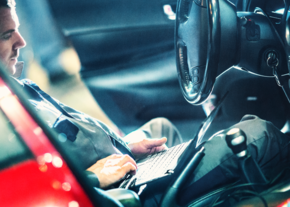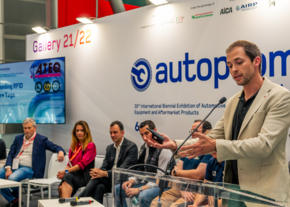
14/12/2023
Not only charging stations: motorways can also recharge cars as they go
Enrica Lazzarini
In Sweden and Italy two examples are being studied on how to make motorway sections efficient
The race towards sustainability also embraces the roads, literally. In Sweden a step forward has been taken with the world's first motorway capable of recharging electric cars while they are in motion, allowing vehicles to be powered while driving along motorways and effectively making recharging more efficient and integrated into drivers' daily routines.
The motorway chosen for the transformation is the E20 that connects Stockholm, Gothenburg and Malmö, the three most populated cities in Sweden. The experimental section is expected to be completed by 2025. Recharging on the road would not only spare drivers the need to stop at petrol stations, but also allow vehicles to travel more kilometres using smaller batteries. Trafikverket, the Swedish transport agency, is still evaluating the type of system to be adopted for inductive charging, which could be static (with plates in the asphalt similar to those used by BMW) or dynamic, implemented with underground cables to send electricity to the collection coils placed on board the cars, which could then recharge on the move. Inductive recharging exploits the fact that a variable magnetic field (possibly generated by another current-carrying coil) investing a coil made of conducting wires 'induces' in it an alternating electric current that varies like the magnetic field. It can then be used to charge the battery without the need for physical contact: both options would not create difficulties for conventional vehicles travelling the same road.
But it is not only Sweden that is making significant progress: a motorway with induction charging is also being tested in Italy. The project called Arena del Futuro is currently being tested on the A35 Brebemi-Aleatica motorway: several companies are involved, including ABB, Electreon, FIAMM Energy Technology, IVECO, IVECO Bus, Mapei, Pizzarotti, Politecnico di Milano, Prysmian, Stellantis, TIM, Università Roma Tre and Università di Parma.
The Dynamic Wireless Power Transfer (Dwpt) induction charging technology for electric cars is made by Electreon, an Israeli company that already uses this system in Israel. It works thanks to coils placed under the asphalt that transfer energy from the road infrastructure to the electric motor as vehicles equipped with a special receiver pass by. The system extends the range and safeguards the vehicle's battery charge. In order to make the transfer of electricity from the asphalt to the vehicle possible, special paving is required. This, about 12 centimetres thick, is made by the Mapei Group and covers the thin tubes that recharge the electric vehicles through the induction process.
Both cases demonstrate how nations are embracing innovation to overcome the challenges of electric vehicle deployment. Sweden, with its dynamic charging highway, aims to make electric travel more convenient and less dependent on traditional charging stations. In Italy, on the other hand, the concept of recharging roads opens up new perspectives for seamless urban mobility.
These initiatives show that the road to a sustainable future could also literally be built under our feet. We will see how this develops in the coming years.
The motorway chosen for the transformation is the E20 that connects Stockholm, Gothenburg and Malmö, the three most populated cities in Sweden. The experimental section is expected to be completed by 2025. Recharging on the road would not only spare drivers the need to stop at petrol stations, but also allow vehicles to travel more kilometres using smaller batteries. Trafikverket, the Swedish transport agency, is still evaluating the type of system to be adopted for inductive charging, which could be static (with plates in the asphalt similar to those used by BMW) or dynamic, implemented with underground cables to send electricity to the collection coils placed on board the cars, which could then recharge on the move. Inductive recharging exploits the fact that a variable magnetic field (possibly generated by another current-carrying coil) investing a coil made of conducting wires 'induces' in it an alternating electric current that varies like the magnetic field. It can then be used to charge the battery without the need for physical contact: both options would not create difficulties for conventional vehicles travelling the same road.
But it is not only Sweden that is making significant progress: a motorway with induction charging is also being tested in Italy. The project called Arena del Futuro is currently being tested on the A35 Brebemi-Aleatica motorway: several companies are involved, including ABB, Electreon, FIAMM Energy Technology, IVECO, IVECO Bus, Mapei, Pizzarotti, Politecnico di Milano, Prysmian, Stellantis, TIM, Università Roma Tre and Università di Parma.
The Dynamic Wireless Power Transfer (Dwpt) induction charging technology for electric cars is made by Electreon, an Israeli company that already uses this system in Israel. It works thanks to coils placed under the asphalt that transfer energy from the road infrastructure to the electric motor as vehicles equipped with a special receiver pass by. The system extends the range and safeguards the vehicle's battery charge. In order to make the transfer of electricity from the asphalt to the vehicle possible, special paving is required. This, about 12 centimetres thick, is made by the Mapei Group and covers the thin tubes that recharge the electric vehicles through the induction process.
Both cases demonstrate how nations are embracing innovation to overcome the challenges of electric vehicle deployment. Sweden, with its dynamic charging highway, aims to make electric travel more convenient and less dependent on traditional charging stations. In Italy, on the other hand, the concept of recharging roads opens up new perspectives for seamless urban mobility.
These initiatives show that the road to a sustainable future could also literally be built under our feet. We will see how this develops in the coming years.








